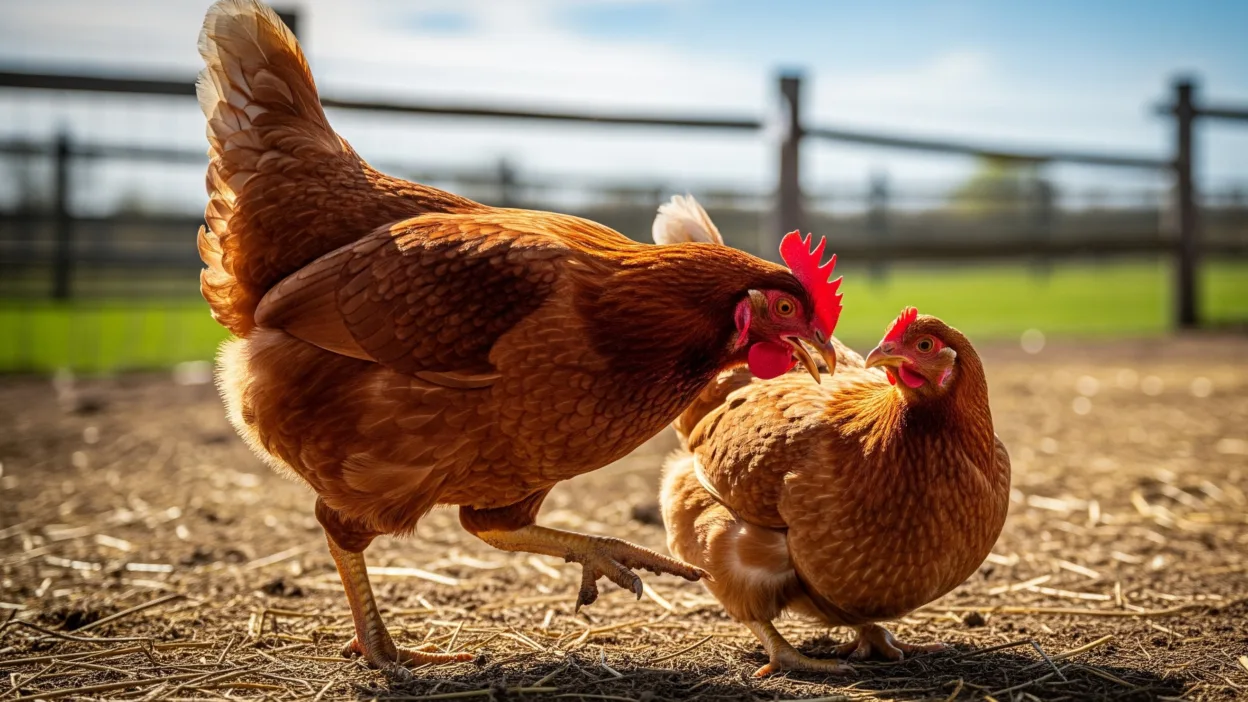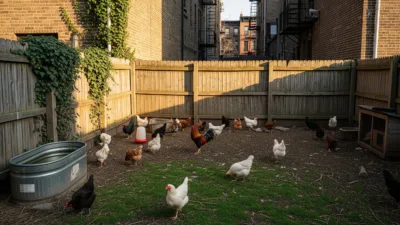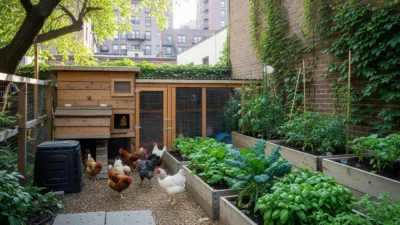Backyard chicken keeping can be rewarding, but it sometimes comes with challenges. One of the most concerning behaviors for new and experienced chicken keepers is feather pecking or aggressive pecking among hens. While pecking is a natural part of chicken behavior and establishes the “pecking order,” excessive or harmful pecking can lead to injury, stress, reduced egg production, and in severe cases, death. Understanding why chickens peck each other and learning effective solutions is key to maintaining a healthy, peaceful flock.
Why Do Chickens Peck Each Other?
Chickens peck each other for many reasons. Most are natural, but sometimes underlying problems in management or environment make the behavior worse. Let’s look at the most common causes.
1. Establishing the Pecking Order
Chickens are social animals that create a hierarchy known as the pecking order. This system decides who eats first, who gets the best roosting spot, and who takes charge. During this process, you’ll see pecking, chasing, and sometimes small fights. This is normal as long as it doesn’t escalate into constant bullying.
2. Overcrowding in the Coop or Run
Limited space often leads to frustration and aggression. If your chickens don’t have enough room to roam, scratch, and dust bathe, they may turn on each other. Experts recommend at least 3–4 square feet per bird inside the coop and 8–10 square feet per bird in the run.
3. Boredom and Lack of Enrichment
Chickens are naturally curious and active. When they don’t have enough to do, they may redirect their energy into pecking flock mates. Lack of perches, dust baths, or foraging opportunities often causes misbehavior.
4. Nutritional Deficiencies
Poor diet can trigger pecking problems. For example:
- Low protein diets may encourage feather eating, since feathers contain protein.
- Mineral deficiencies (calcium, sodium, sulfur) can lead to unusual pecking habits.
- Inconsistent feeding schedules can also increase stress and aggression.
5. Stress from Environmental Factors
Stressful situations like loud noises, predator pressure, poor ventilation, or extreme temperatures may cause chickens to lash out at one another.
6. Bullying by Dominant Birds
Sometimes one or two hens become overly dominant and pick on weaker or smaller flock members. This can result in bald patches, open wounds, and long-term health problems.
How to Stop Chickens from Pecking Each Other
The good news is that pecking behavior can usually be managed with simple adjustments to housing, feeding, and flock management. Here are effective strategies.
1. Provide Adequate Space
Make sure your chickens have enough room. Overcrowding is the number one cause of feather pecking. Expand your coop or build a larger run if needed. Consider free-ranging your flock, even for short periods each day, to reduce stress.
2. Improve Their Diet
A balanced diet prevents aggression caused by deficiencies. Provide a high-quality layer feed with at least 16% protein. Supplement with:
- Cracked corn or grains in moderation during winter for extra energy
- Protein treats like mealworms or black soldier fly larvae
- Mineral supplements such as crushed oyster shells (for calcium) and grit
Avoid feeding too many scraps that may dilute nutrition.
3. Reduce Boredom with Enrichment
Enrichment keeps chickens busy and less focused on each other. Try these ideas:
- Hang a cabbage or lettuce head for them to peck at
- Scatter scratch grains in bedding so they forage
- Provide dust bath areas with sand, wood ash, and diatomaceous earth
- Add perches, stumps, and ladders to encourage activity
4. Control Stress Factors
Keep your flock safe and calm by reducing stressful conditions:
- Ensure proper ventilation in the coop
- Maintain consistent lighting (14–16 hours of light in laying season)
- Protect against predators with secure fencing and hardware cloth
- Avoid sudden changes in environment or flock size
5. Isolate Injured or Bullied Birds
If you notice bleeding or missing feathers, separate the victim immediately. Chickens are naturally attracted to blood, and even minor wounds can become targets for more pecking. Use a chicken saddle or apron to protect bare backs until feathers regrow.
6. Identify and Manage Aggressors
If one hen is causing the problem, you may need to isolate her temporarily. In severe cases, re-homing the bully may be necessary to restore harmony.
7. Use Peck Deterrents (When Necessary)
There are safe sprays and ointments with bitter flavors or dark coloring that discourage pecking at wounds. Always choose flock-safe products.
Preventing Pecking Before It Starts
It’s always easier to prevent aggressive behaviors than to fix them later. Follow these best practices to raise a peaceful flock:
- Raise chicks together: Birds raised from a young age as one flock have fewer conflicts.
- Avoid sudden introductions: When adding new hens, use a see-but-don’t-touch method. Place newcomers in a separate pen within sight for a week before mixing.
- Choose docile breeds: Some breeds like Silkies, Cochins, and Orpingtons are more laid-back, while Leghorns or Rhode Island Reds may be more aggressive.
- Keep roosters carefully: Too many roosters or overly aggressive ones can increase pecking issues.
When Pecking Becomes a Serious Problem
Occasional pecking is normal, but constant aggression is not. If pecking results in bleeding, missing feathers, or extreme stress, intervention is necessary. Long-term feather loss may reduce a hen’s ability to stay warm, and constant bullying can prevent birds from accessing food and water.
If management changes don’t help, consult a veterinarian or poultry specialist. Underlying health issues, parasites, or nutritional problems might be contributing to the behavior.
Chickens peck each other for natural and environmental reasons, but excessive pecking should not be ignored. By ensuring enough space, offering a balanced diet, reducing stress, and providing enrichment, you can maintain a calm and healthy flock. Keep a close eye on your birds, and address problems early to avoid injuries and loss.
Raising backyard chickens should be a joyful experience. With the right management, your hens will live peacefully, stay healthy, and reward you with fresh eggs every day.



